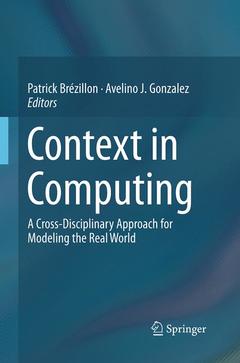Description
Context in Computing, Softcover reprint of the original 1st ed. 2014
A Cross-Disciplinary Approach for Modeling the Real World
Coordinators: Brézillon Patrick, Gonzalez Avelino J.
Language: English
Subject for Context in Computing:
Support: Print on demand
573 p. · 15.5x23.5 cm · Hardback
Description
/li>Contents
/li>Comment
/li>
This volume explores how context has been and can be used in computing to model human behaviors, actions and communications as well as to manage data and knowledge. It addresses context management and exploitation of context for sharing experience across domains.
The book serves as a user-centric guide for readers wishing to develop context-based applications, as well as an intellectual reference on the concept of context. It provides a broad yet deep treatment of context in computing and related areas that depend heavily on computing. The coverage is broad because of its cross-disciplinary nature but treats topics at a sufficient depth to permit a reader to implement context in his/her computational endeavors.
The volume addresses how context can be integrated in software and systems and how it can be used in a computing environment. Furthermore, the use of context to represent the human dimension, individually as well as collectively is explained. Contributions also include descriptions of how context has been represented in formal as well as non-formal, structured approaches. The last section describes several human behavior representation paradigms based on the concept of context as its central representational element.
The depth and breadth of this content is certain to provide useful as well as intellectually enriching information to readers of diverse backgrounds who have an interest in or are intrigued by using context to assist in their representation of the real world.
Introduction.- The CSS design process: on supporting context-sensitive systems development.- Context-driven testing on the cloud.- Context-based search, recommendation and browsing in software development.- Context aware and adaptive systems.- Context-aware middleware: A review.- Context-centered tools for Intelligent Assistant Systems.- Context and machine learning.- A Bayesian Framework for Life-Long Learning in Context-Aware Mobile Applications.- Context and NLP.- The QoCIM framework concepts and tools for quality of context management.- Contextualized scientific workflows in the cloud.- Context-sensitive trust evaluation in cooperating smart spaces.- The Cognitive Science basis for context.- User-centered Approaches to Context Awareness: Prospects and challenges.- Event quality awareness for contextualized decision support in e-health applications.- Computing the context effect for science learning.- Contextual cognition in social simulation.- SocioPlatform: A Platform for Social Context-Aware Applications.- Context and User-Centered Approaches: Icons in Cross-Cultural Context.- Context and Collaborative Work: A context-sensitive intervention approach for collaboration in dynamic environment.- The role of context and its elements in Situational Assessment.- Context and community Awareness in Support of user Intent Prediction.- Multi-context logics-a general introduction.- Constraint programming for context comprehension.- Context and Implicature.- Formalizing Context for Domain Ontologies in Coq.- Context and granularity.- Context and Case-based Reasoning.- Tactical reasoning through context-based reasoning.- Experience-based Reasoning by Contextual Graphs.- Representing Experience-based reasoning by Contextual Graphs.- Context-awareness in Multi-Agent Systems for Ambient Intelligence.- Contextual reasoning in an intelligent Electronic Patient Leaflet System.




